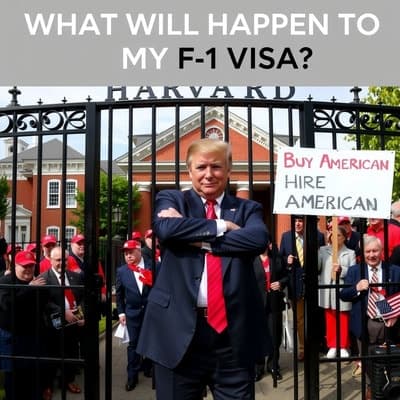US Student Visa System Under Scrutiny Over Perceived Immigration Pathway

The integrity of the United States' student visa system is facing renewed debate, with critics arguing that F-1 visas, designed for temporary academic pursuits, are increasingly viewed and utilized as a direct pathway to long-term immigration and entry into the U.S. labor market. This perspective suggests a deviation from the visas' intended nonimmigrant purpose.
Social media commentator Ben B. @dejo articulated this concern, stating in a recent tweet, "Many if not most [foreign] students come to USA for education because it presents a reliable path to immigration and work, life & stay in USA. And that’s exactly the problem! Student visas are temporary nonimmigrant visas that are not meant to affect the labor market!" This sentiment highlights a growing tension surrounding the role of international students in the U.S.
U.S. student visas, primarily the F-1 for academic and M-1 for vocational studies, are explicitly nonimmigrant classifications. Official U.S. Department of State guidelines state that these visas are issued for the sole purpose of study, requiring students to demonstrate an intent to return to their home country upon completion of their program. Students must maintain their status by fulfilling this primary purpose and adhering to associated regulations.
However, programs like Optional Practical Training (OPT) allow F-1 students to work in their field of study for up to 12 months post-graduation, with STEM graduates eligible for an additional 24-month extension. While intended to provide practical experience, OPT is frequently seen as a crucial stepping stone to securing an H-1B skilled worker visa, which is a "dual intent" visa allowing for eventual green card application. This bridge between temporary study and potential permanent residency fuels the debate over the visas' true intent.
The discussion intensifies amidst concerns about the impact of post-study work authorizations on the domestic labor market. Critics argue that the current system allows foreign graduates to compete directly with American workers, particularly in high-demand STEM fields, potentially affecting wages or limiting opportunities for U.S. citizens. Some political factions have targeted OPT, accusing it of "killing jobs for new American college graduates."
Conversely, proponents emphasize the significant economic and academic contributions of international students. In 2023-2024, international students contributed an estimated $43.8 billion to the U.S. economy and supported 378,175 jobs. They are crucial for maintaining the U.S.'s global leadership in innovation and research, often filling critical skill gaps and enriching academic environments. Many argue that without clear pathways to employment, the U.S. risks losing top talent to countries with more welcoming post-study work policies.
Recent policy discussions have also included proposals to replace the F-1 visa's "duration of status" with a fixed four-year limit, which could create administrative burdens and uncertainty for students in longer programs. This ongoing debate underscores the complex balance between attracting global talent, protecting domestic labor, and upholding the original intent of nonimmigrant visas.